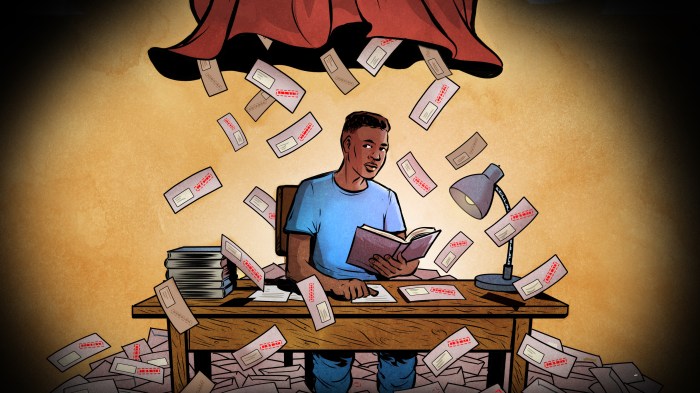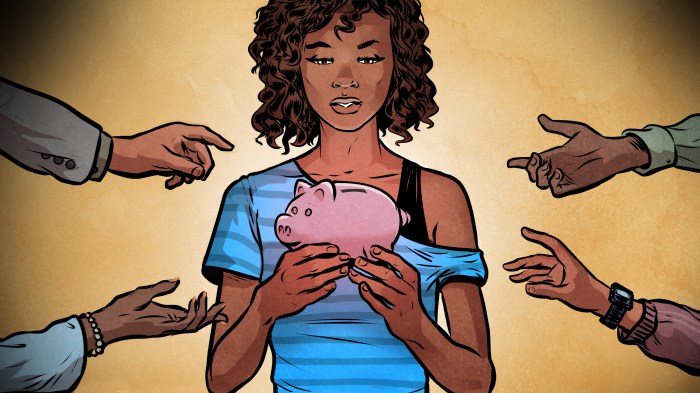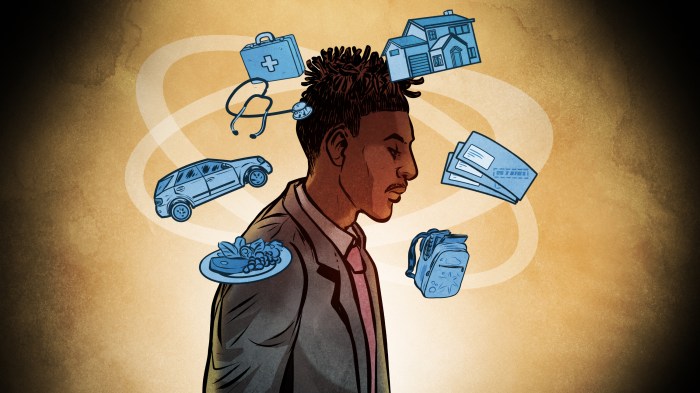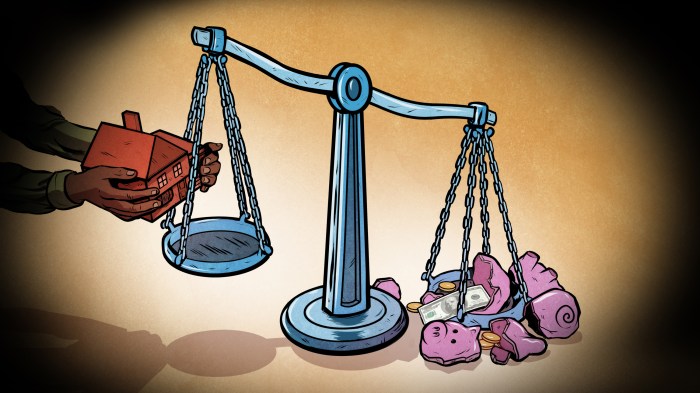Life & Debt is a series looking at the disproportionate impact of financial debt on the Black community.
Lawrence and Nikki Gilliam have a plan.
The couple has been together for 30 years and raised two children — a son and a daughter who they put through college at Morehouse and Spelman, respectively. Gilliam works for a software firm, and his wife Nikki is an educator.
As a native of Los Angeles, Gilliam, 52, has seen the housing market change dramatically from the time he and his wife, 50, bought their first home together in 1996.
“It was a condo in View Park, and we got it for $130,000,” Gilliam said. “Considering what today’s market looks like, it’s kind of crazy to think about how accessible it was back then for two early professionals to scrape together the $8,000 we needed for a down payment and be able to buy that home.”
The median sales price of a home in Los Angeles in August was $980,000, according to Redfin.
In 2021, the Black homeownership rate in LA was 33.5%, according to the U.S. Census, the 124th lowest among metropolitan areas in America. At the same time, 58% of white households in the LA metro area owned homes. Besides a legacy of discriminatory housing practices and policies that historically prevented Black families from buying homes and building generational wealth, the National Association of Real Estate Brokers said, the ability to come up with the 20% down payment required to buy a home with a conventional mortgage is also an impediment.
In short, Black people often make enough money to pay a house note, but they lack the ability to build enough savings to make a down payment.
The high housing costs aren’t unique to big cities. In the 2023 Snapshot of Race and Home Buying in America, the National Association of Realtors Research Group said “rising mortgage rates and home prices significantly hurt affordability, forcing many buyers out of the market.” The report stated mortgage rates have doubled since the previous year and housing prices have reached an all-time high.
 What you should know about repaying your public student loansRead now
What you should know about repaying your public student loansRead now
This creates a huge disparity in the way wealth is built in white families versus Black families. The Realtors research group noted that in 2019, the average net worth of a white family was $188,200 and Black families’ average net worth was only $24,100.
Additionally, while white home ownership has remained near 70% since 2017, only 41% of Black households own a home.
With rents also increasing, it means that it is even harder for families to save money to buy a home.
The Gilliams have watched the changes in the housing market over the years, and they said if they knew then what they know now, they would have held onto their first home when they bought their second home in 1999.
Their second and current home, a house in Leimert Park, was purchased from Gilliam’s mother and grandfather, and the Gilliams are insistent that their children keep it in the family and not sell it. They have set up the same plan for the home Gilliam’s mother and stepfather currently live in as well. Gilliam’s parents have three grandchildren, and each has an equal interest in their home, and it has been impressed upon the Gilliams that those homes should never be sold, no matter what.
“That is the plan,” Gilliam said. “These homes should be passed down generation after generation and never leave the family. Ever.”
Gilliam has watched as friends he grew up with inherited their parents’ homes in Baldwin Hills, View Park, Windsor Hills, and Leimert Park — four South Los Angeles neighborhoods that are considered some of the wealthiest Black areas in America.
The properties continue to appreciate in value, but a lot of his friends sold the homes their parents left them. Now, white families are moving into what used to be upwardly mobile Black enclaves, pricing out Black residents looking to buy.
“The worst part about it,” Gilliam said, “is they sold the homes when they only got $400,000 for them.” Today, houses in that section of the city regularly sell for upward of $1 million.
“It’s sad to see that happen, but I understand how and why it happens,” he said, citing the expense of maintaining a home as one example of why people sell homes they inherit. “I think it’s a shame that it does happen that way, but unfortunately given the finances of a lot of folks that we grew up with, if you inherit $300,000 and you’re 35 years old, you might just take that cash.
 I’m never paying my student loans back. Here’s why.Read now
I’m never paying my student loans back. Here’s why.Read now
“That’s supposed to be an asset that can be a part of your financial structure for the next 50 years, or for the lifetime of your kids and their kids. But again, it’s easy to understand how it happens because a lot of times we don’t get those big paydays,” he said.
Nikki Gilliam agreed, but said that was part of the challenge facing Black people.
“I think it’s the way that we frame it and the way we look at it,” she said. “You just said, ‘We don’t often get those big paydays,’ and if we look at it like a payday, then we’ll cash out, right?”
The Gilliams consider their current home to be a “multigenerational inheritance,” and that is something that Gilliam is proud of.
“My mother and grandfather bought that house together in around 1991 or 1992. When my grandfather decided he didn’t want to live there anymore, my mother was going to keep the house anyway because she saw it as something she could pass down to her children. Nikki and I purchased the house from her, and now it’s ours to pass down to our children.”
Gilliam said thinking back, he wishes he and Nikki had kept their View Park condo because it could have been an asset to pass down to their children.
“At 29, having just gotten this other house from my parents, I didn’t have the wisdom to understand how it could have benefited us down the line.”
Darnell Lamont Walker, a 41-year-old writer for children’s television, said his motivation for acquiring real estate was to build generational wealth to pass down to his son who just started college.
At the time he bought his first home in 2020, he was working as a writer and script coordinator for Blue’s Clues.
“It was at the beginning of the pandemic. Rents in New York were way down, and I was considering moving to an apartment on the Upper West Side that had gone from $3,500 a month to $1,600 a month,” he said. “But then a friend said, ‘Didn’t you always say you wanted to live in a cabin? Why don’t you buy your cabin?’ ”
After that conversation, Walker saw a tweet in which someone had added up how much they’d spent over the years in rent and lamented about it. When Walker did the same, he knew it was time to make a change.
 When that regular paycheck means a line of family members asking for loansRead now
When that regular paycheck means a line of family members asking for loansRead now
“I went on Zillow and literally just drew a big circle around all the trees in the Blue Ridge Mountains [in Georgia], and my cabin popped up, and I was like, that’s what I want. I got in touch with a Realtor, and she made it happen,” he said.
Walker said his “claim to fame” is that the cabin he built is located in the same woods where the events in the movie Cocaine Bear took place. “It’s about an hour and a half north of Atlanta, in the Chattahoochee National Forest,” he said.
After finding his forest hideaway, Walker got a call from his mother in November 2022 letting him know his grandmother was planning to sell her home in Detroit. A man had knocked on her door and offered her $11,000 for her four-bedroom, two-bath home. While he had no plans to move to Detroit, Walker looked up the appraisal value anyway and found out the house was worth $14,000.
He immediately caught a flight to Detroit so he could talk to his grandmother about purchasing her home.
“I offered her $12,000 in cash and told her she could stay in the home as long as she needed. I told her I would come back in the spring to do some renovations,” he said. Walker installed new plumbing and updated the kitchen. Though he says “it’s at 100%,” he still plans to continue to spruce up the place.
Through a program with the Detroit Land Bank Authority, Walker was able to purchase two lots behind his grandmother’s house.
The bank authority calls the program “Neighborhood Lots,” and it enables homeowners to purchase up to two vacant lots for $250 each that are within 500 feet of a home they already own.
“So now it looks like I have a huge backyard because the lots are on the street behind me and separated from the house by a small alley,” Walker said.
Walker is originally from Charlottesville, Virginia, and he said he recently attempted to buy a property there, but the deal fell through.
 Worries about debt are part of my inheritanceRead now
Worries about debt are part of my inheritanceRead now
“This was one of the last Black-owned houses in the neighborhood where I grew up, and I thought if I could get this, I could hold onto it for years to come, but unfortunately, they went with a cash offer.”
Walker said he plans to continue to seek out more opportunities to buy properties because he wants to leave the future generations of his family something they can enjoy for years to come.
“I had these white friends when I was growing up in Virginia, and they would always say, ‘Hey, let’s go hang out at my uncle’s place for the weekend’ or ‘My grandmother has this cool house we can go to and just chill and have fun,’ ” he recalled.
“I want to have something like that so my kids and my nephews and nieces could just be like, ‘Hey, let’s just go to my uncle’s place,’ ” he said.
“It’s that, and it feels great having that, but it also feels great knowing I am building something for my son so that he will have a jump start in life,” Walker added.
Genie Lauren just closed on her first home at the end of August.
The 39-year-old New York City native works at a consulting firm, and she told Andscape her home-buying experience was a long one.
“People had told me about this program called NACA, and I initially looked into getting a home through them,” said Lauren, who began her search in 2021.
The Neighborhood Assistance Corporation of America is a nonprofit organization that provides buyers with mortgages with low interest rates and no down payment needed, no closing costs or fees, and relaxed credit requirements in order to qualify for their loan products.
Lauren decided the program was not for her because it limited which neighborhoods she could live in, and went about finding a traditional real estate agent to help her with her search.
“I think I finally found a Realtor in early 2022,” she said. “We began going to open houses in the summer of 2022.
“I put an offer on a home … in either August or September of 2022. In the first week of October, I found out that a cash offer had swooped in and bought the house out from under me before we could get under contract.”
Lauren said the incident was upsetting and left her exhausted. It’s also quite common, especially with corporations gobbling up hundreds of thousands of single-family homes to rent them out. While it might be a boon for Wall Street, it makes it more difficult for first-time homebuyers like Lauren to find an affordable home.
After losing out to a cash offer and competing with other buyers on multiple houses, Lauren said, she “needed a breather from the whole house hunting process.”
“I took a break until after the holidays and began looking in earnest in February of this year with a whole new Realtor, and she was great,” she said.
By April, Lauren had put an offer in on two houses, one of which ended up in probate and was therefore unable to be sold. The second home had been on and off the market for some time.
Lauren said the house she eventually bought was near the first house she bid on — the house she really wanted.
“They accepted my offer sometime in May, and we finally closed on Aug. 25,” she said. “It’s been a long road with lots of ups and downs, but I’m finally here. A first-time homeowner. By myself.”
Lauren is single with no children, and she said going through this process on her own was daunting. She doesn’t recommend it for anyone else — especially in this market.
“Not unless you’re rich,” she said, laughing. “No one wants to buy with these interest rates.”
Lauren said there were a lot of parts of the process that caught her off guard.
“I had to explain every Zelle transaction where I loaned money to someone,” she said. “If I knew then what I know now, I would have just taken out the cash and given it to them.”
Like many people, one of the biggest reasons Lauren wanted to buy a home was because of what it will mean for her family.
“I really wanted to be in a place where I can host family gatherings. I’m accessible to all my family. I’m right by freeways and trains. So I foresee barbecues and holidays and family gatherings,” she said.
“This is my forever home,” she said. “This is where I’m going to live and have my children.”
Monique Judge is a storyteller, content creator and writer living in Los Angeles. She is a word nerd who is a fan of the Oxford comma, spends way too much time on Twitter, and has more graphic t-shirts than you. Follow her on Twitter @thejournalista
or check her out at http://moniquejudge.com



